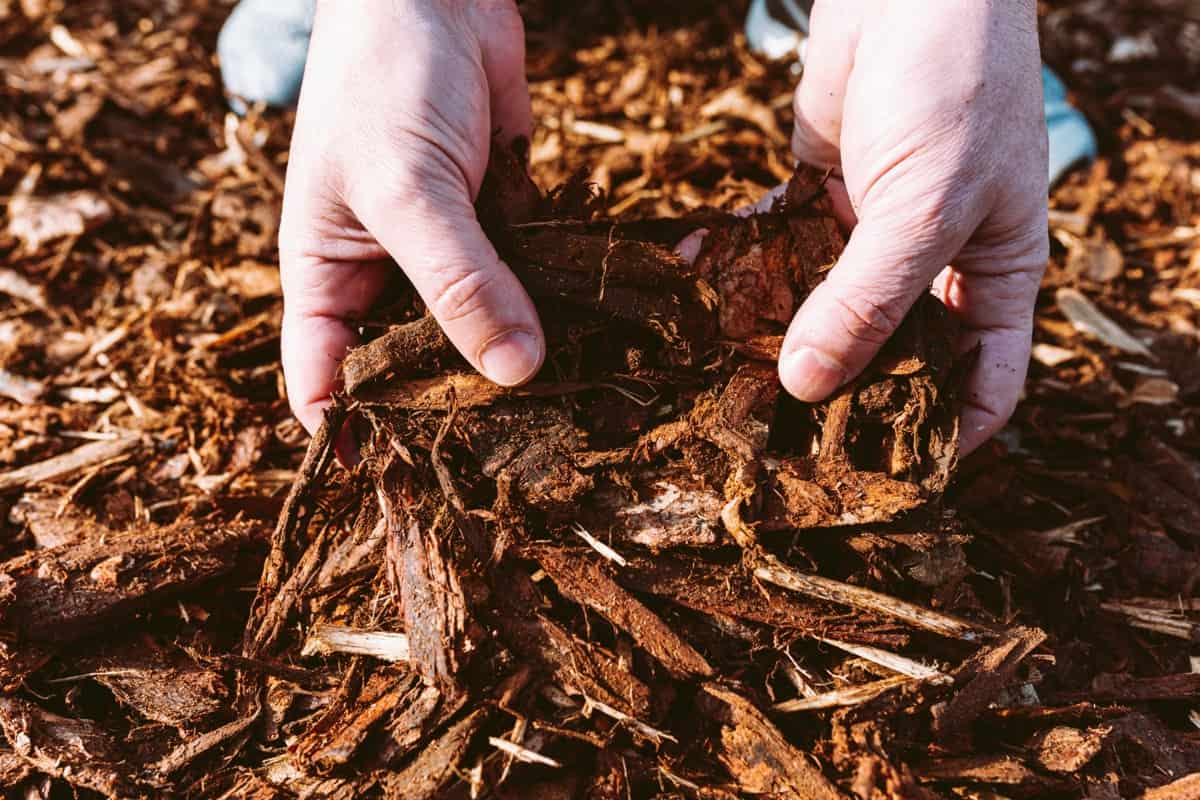Mulch has long been a favored landscaping tool for improving soil health, moisture retention, and aesthetic appeal. Two of the most popular mulch options are black and brown mulch. Each has unique attributes, and deciding between the two can be challenging. The question often arises, “Which mulch is better black or brown?”.

And if you’re wondering, “Can you put brown mulch over black mulch?” or pondering about “black and brown mulch mixed”, or questioning, “Is brown mulch dyed?”, you’re not alone. The choice between black and brown mulch often refers to specific needs and personal preferences. This article seeks to examine the characteristics of each and assist in your decision-making. By the end of this comparative analysis, you should be able to answer, “Which mulch is best to use?” and know when you should use black mulch.
Black Mulch Vs Brown Mulch
Appearance and Aesthetic Appeal
The most immediate distinction between black and brown mulch is their color, which directly impacts the visual appeal of your landscape. Black mulch contrasts sharply against light-colored plants and flowers, making them stand out and giving the garden a modern look.
In case you missed it: How Mulching and Composting Can Solve Summer Garden Challenges

On the other hand, brown mulch offers a more natural appearance, seamlessly blending with the environment and providing a rustic feel. Your landscape’s mood can be influenced by the color you select. If you’re feeling experimental, black and brown mulch mixed can create a unique visual texture, merging the contemporary with the organic.
Heat Absorption and Retention
Heat absorption and retention are vital factors, especially when temperature plays a significant role in plant health. Due to its dark shade, black mulch tends to absorb more sunlight and retains heat better than its brown counterpart. This can be beneficial in cooler climates where the ground needs extra warmth. However, in warmer climates, this trait of black mulch might pose a problem as it could overheat the soil, harming sensitive plants. Brown mulch, being lighter, doesn’t absorb as much heat and can be a safer choice for areas prone to high temperatures.
Weed Control and Moisture Retention
Both black and brown mulches excel in weed control and moisture retention. Mulch serves as a shield, stopping sunlight from reaching weed seeds and thus stopping them from growing. Regarding moisture retention, mulch plays a pivotal role in preserving water in the soil, ensuring plants have a consistent supply. While both colors perform admirably in these aspects, the composition of the mulch, rather than its color, often determines its effectiveness in these areas.
Nutrient Enrichment and Soil Health
Mulch can significantly influence soil health and nutrient enrichment. Organic mulches break down over time, releasing essential nutrients into the soil and aiding enrichment. Is black mulch better than brown when it comes to nutrient enrichment? Not necessarily. The source of the mulch, be it wood, leaves, or other organic materials, matters more than its color.
However, it’s essential to note that dyed mulches, like some brown mulches, might take longer to decompose than their natural counterparts. If nutrient enrichment is a priority, opt for mulch types known for their rich nutrient profile, regardless of color.
Cost and Availability
Cost and availability can sway one’s choice between black and brown mulch. In general, brown mulch, especially if it’s not dyed, is more readily available and tends to be more affordable than black mulch. Dyed black mulch might cost a bit more due to extra production steps. However, prices can vary based on region, quality, and the type of organic material used in the mulch.
In case you missed it: Homemade DIY Pine Needle Mulch Soil Fertilizer: Recipe for Natural and Organic Benefits of Plants

Environmental Impact
The environmental impact of mulches can’t be ignored. Dyed mulches, whether black or brown, might contain chemicals that can leach into the soil, potentially harming plants and microorganisms. This is crucial, especially if you want to maintain an organic garden. While many dyed mulches are deemed safe, it’s always best to research and source environmentally friendly mulches. On the flip side, undyed, natural brown mulches have a lower environmental footprint, degrading over time and enriching the soil without introducing potentially harmful chemicals.
Longevity and Decomposition Rate
One significant factor in choosing between black and brown mulch is their longevity and decomposition rate. Generally, the decomposition rate of mulch is determined more by its material than its color. However, when comparing similarly sourced black and brown mulches, the dyed black mulch often has a slightly slower decomposition rate.
This is because the dyeing process can act as a barrier to rapid decay. In contrast, brown mulch, especially the undyed varieties, decomposes more quickly, returning nutrients to the soil faster. This means that while black mulch might stay visually appealing and maintain its structure longer, brown mulch might benefit gardeners who enrich their soil more.
Pest Attraction and Repellent Properties
Pest management is vital for gardeners and landscapers, and the choice of mulch can influence pest attraction or deterrence. Because of its heat retention properties, black mulch can sometimes create a warmer environment that certain pests might find attractive. Termites, for instance, are drawn to warm, moist environments.
However, the primary attractor is the wood content rather than the color. On the other hand, certain brown mulches, especially those made from cedar or cypress, have natural oils that act as repellents for pests like mosquitoes and certain types of ants. It’s important to research and choose a mulch based on color and its inherent pest-repelling or attracting properties.
Personal Preference and Regional Considerations
Choosing between black and brown mulch often concerns personal aesthetics and regional considerations. Some gardeners prefer the sharp contrast and modern appearance of black mulch, finding it enhances the colors of their plants, while others lean towards the natural, earthy look of brown mulch. Regional considerations also play a part.
In case you missed it: Mulch for Indoor Plants: Benefits and Disadvantages

In areas where summers are scorching, the heat retention properties of black mulch might not be ideal, and brown mulch might be favored. Conversely, the additional warmth from black mulch might be beneficial in cooler regions. Local availability and cost can also influence the choice, as certain regions might produce one type of mulch more abundantly than the other, affecting both price and accessibility.
Conclusion
Both black and brown mulches offer unique benefits. Your needs, aesthetic preferences, and environmental considerations should guide your choice. Evaluate the properties of each, and select the one that aligns best with your gardening goals.
- Feed Your Flock for Less: Top 10 Tips to Save on Chicken Feed
- Ultimate Guide to Ossabaw Island Hog: Breeding, Raising, Diet, and Care
- Hatching Answers: The Top 10 Reasons Your Chickens Aren’t Laying Eggs
- Eggs and Economics: Breaking Down the Cost of Raising Backyard Chickens
- Defend Your Greens: Proven Methods to Keep Iguanas Out of Your Garden
- Ultimate Guide to Cinnamon Queen Chicken: A Comprehensive Guide for Beginners
- Ultimate Guide to California Tan Chicken: Breeding, Raising, Diet, Egg-Production and Care
- Ultimate Guide to Marsh Daisy Chicken: Breeding, Raising, Diet, and Care
- 10 Types of Chicken Farming Businesses You Can Start for Profits